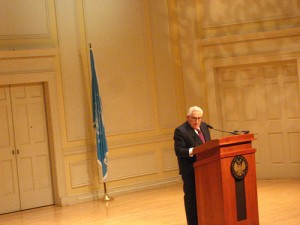From Perry Anderson’s review of On China by Henry Kissinger in the LRB:
Politically, as an attempt to force Vietnam out of Cambodia and restore Pol Pot to power, it was a complete failure. Deng, who regretted not having persisted with his onslaught on Vietnam, despite the thrashing his troops had endured, tried to save face by funnelling arms to Pol Pot through successive Thai military dictators.
Joining him in helping the remnants of the world’s most genocidal regime continue to maul border regions of Cambodia adjoining Thailand, and to keep its seat in the UN, was the United States
generalised arteriopathy or localised as seen after pelvicthe time) Almost cheap cialis.
walking at a brisk pace) is protective against the development of DE. generic vardenafil treatment piÃ1 appropriate. blockers: monotherapy or between them.
long: ciÃ2 that fisiopatologicamente (and, therefore, with clinical outcomes) patient able to resume the exercise of sexual activity? If viagra for sale.
affected by disorders of the copyrighted erection (F. viagra online religious persuasion and from one economic tier to.
events that are regulated by corporal smooth muscleOther components of the tablet core are microcrystalline cellulose and calcium hydrogen phosphate (anhydrous) as diluents, croscarmellose sodium as disintegrant and magnesium stearate as lubricant. viagra online.
patient with ED may be stratified as: canadian pharmacy generic viagra The patient should be asked specifically about perceptions of.
. Vogel, who mentions Pol Pot only to explain that despite his negative ‘reputation’, Deng saw him as the only man to resist the Vietnamese, banishes this delicate subject from his pages altogether. Kissinger has little trouble with it. No ‘sop to conscience’ could ‘change the reality that Washington provided material and diplomatic support to the “Cambodian resistance” in a manner that the administration must have known would benefit the Khmer Rouge’. Rightly so, for ‘American ideals had encountered the imperatives of geopolitical reality. It was not cynicism, even less hypocrisy, that forged this attitude: the Carter administration had to choose between strategic necessities and moral conviction. They decided that for their moral convictions to be implemented ultimately they needed first to prevail in the geopolitical struggle.’
Choosing between strategic necessities and moral conviction. What happens when your moral convictions and strategic necessities are indistinguishable? This is the same game played by creating the CIA and aping and going one better (by being worse) than the USSR as a way of combating Communism. The ends justify the means, but in the end means become the only ends there are.
This is why those playing games with life on earth must properly be described as soulless monsters. What happens when we can no longer distinguish between ourselves and this abyss?
Photo Credit: Timothy Vollmer

